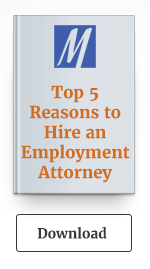 With the holiday season close at hand, many workers hope to take some time off to spend with family and friends, rest and relax, or engage in religious celebrations. With the wide range of diversity in New Jersey, employees may celebrate many different holidays in many disparate ways. Do you know what your rights are in the workplace regarding time off for religious holiday celebrations?
With the holiday season close at hand, many workers hope to take some time off to spend with family and friends, rest and relax, or engage in religious celebrations. With the wide range of diversity in New Jersey, employees may celebrate many different holidays in many disparate ways. Do you know what your rights are in the workplace regarding time off for religious holiday celebrations?
New Jersey State Holiday Observances
New Jersey observes eleven set holidays each year, including Good Friday (before Easter Sunday) and Christmas. In addition to any general election day, all Saturdays after 12 p.m. (noon) and all Sundays are also legal state holidays. This designation means that state employees are entitled to these days off without sacrificing pay.[1] Private employers, however, are not required to allow employees to take these holidays off, either with our without pay. They are also not required to pay employees extra, such as “holiday pay,” time and a half, or double time, if they require employees to work on any of these days.
What Is “Reasonable” Accommodation?
Title VII (the federal law prohibiting discrimination) and the New Jersey Law Against Discrimination (NJLAD) require employers to allow employees time off for their religious observances, as long as such accommodation is “reasonable” and does not impose an “undue hardship” upon the employer. An employee must give an employer notice of their requested time off, and the employer is required to engage in attempts to determine what is a reasonable accommodation. This may or may not involve granting an employee their specific request. Depending on the situation, a reasonable accommodation may include working earlier or later hours, switching schedules or shifts, taking unpaid leave, or exhausting paid leave (PTO or vacation).
For example, an employee who normally works swing shift (3:00 p.m. to 11:00 p.m.) celebrates Hanukkah. He requests eight days off for religious purposes as accommodation; he plans to travel out of state to celebrate with family. After engaging in the interactive process to determine what religious observances his sincerely held beliefs require, his employer refuses his request for eight days off but offers to transfer him to a first shift (seven a.m. to three p.m.) schedule for the time. A court could find that this satisfies the employer’s duty to offer a reasonable accommodation, even though it is not what the worker wanted.
What is “reasonable” is different for each set of facts and depends on the size of the employer, the nature of the employment, and other individual circumstances. In one case, for example, a New Jersey federal court ruled that a Christian bus driver’s request to schedule his hours outside the Sabbath was “unreasonable” because he was subject to a collective bargaining agreement under which workers’ selection of schedules was based upon seniority. The court found that allowing him to set his own schedule would unreasonably prejudice other workers’ seniority rights.[2]
Exception for “Undue Hardship”
An employer does not have to provide accommodation for an employee if it would be an undue hardship. Whether a request presents an undue hardship also depends upon the specific facts of each case. The U.S. Supreme Court has defined undue hardship as an accommodation that imposes a “more than de minimus” (minimal) burden on the employer’s business operations.[3] If a request would require an employer to hire additional or replacement labor, suffer losses of time or money due to reduced productivity, or otherwise incur financial costs or logistical difficulties, it may meet this standard.
The NJLAD sets a higher benchmark, defining undue burden as “accommodations requiring unreasonable expense or difficulty” that result in an employee being unable to perform the essential functions of his or her designated job or that require “unreasonable interference with the safety or efficient operation of the workplace.”[4] Employers must make a “bona fide effort” to accommodate a reasonable request based on a sincerely held religious belief.
Seek Legal Counsel for Denial or Retaliation
It is in violation of the NJLAD to retaliate against an employee for requesting an accommodation related to sincerely held religious beliefs or to refuse to engage in the interactive process with employees who request an accommodation.
If you believe you have been the victim of an adverse employment action based on your religious beliefs, you should consult with an experienced employment lawyer. The attorneys at the Mark Law Firm can help protect your rights and recover damages if appropriate. Contact us today to make an appointment at any of our convenient locations in Basking Ridge, Newark, or Jersey City, New Jersey, or call 973-440-2311, 908-626-1001, or 201-787-9406 today.
[1] NJ Rev. Stat. Sec. 36:1-1 et seq.
[2] Fouche v. NJ Transit Corp., 470 Fed. Appx. 96 (2012).
[3] Trans World Airlines, Inc. v. Hardison, 432 U.S. 63 (1977).
[4] NJ Rev. Stat. Sec. 10:5-12.



.svg)